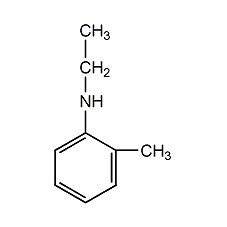
Structural formula
| Business number | 0280 |
|---|---|
| Molecular formula | C9H13N |
| Molecular weight | 135.21 |
| label |
N-ethyl o-toluidine, 2-Methyl-N-ethylaniline, N-ethyl-2-methylaniline, Ethylamino-o-toluene, N-Ethyl-o-toluidine, N-ethyl-2-methyl-Benzenamine, CH3C6H4NHC2H5 |
Numbering system
CAS number:94-68-8
MDL number:MFCD00026695
EINECS number:202-354-3
RTECS number:None
BRN number:2689722
PubChem number:24846660
Physical property data
1. Properties: Colorless transparent liquid
2. Density (g/mL, 20℃): 0.948
3. Relative vapor density (g/mL, air = 1): Undetermined
4. Melting point (ºC): -15
5. Boiling point (ºC, normal pressure): 218
6. Boiling point ( ºC, 1.3KPa): 95.5
7. Refractive index: 1.546
8. Flash point (ºC): 88
9. Specific rotation (º ): Undetermined
10. Autoignition point or ignition temperature (ºC): Undetermined
11. Vapor pressure (mmHg, 85ºC): Undetermined
12. Saturated vapor pressure (kPa, ºC): Undetermined
13. Heat of combustion (KJ/mol): Undetermined
14. Critical temperature (ºC): Undetermined
15. Critical pressure (KPa): Undetermined
16. Log value of oil-water (octanol/water) partition coefficient: Undetermined
17. Explosion upper limit (%, V/V): Undetermined
18. Explosion lower limit (%, V/V): Undetermined
19. Solubility: Easily soluble in ethanol and Ether.
Toxicological data
None
Ecological data
This substance is harmful to the environment and it is recommended not to let it enter the environment. Special attention should be paid to the pollution of water bodies.
Molecular structure data
1. Molar refractive index: 45.32
2. Molar volume (cm3/mol): 141.6
3. Isotonic specific volume (90.2K ): 343.5
4. Surface tension (dyne/cm): 34.5
5. Polarizability (10-24cm3): 17.96
Compute chemical data
1. Reference value for hydrophobic parameter calculation (XlogP): None
2. Number of hydrogen bond donors: 1
3. Number of hydrogen bond acceptors: 1
4. Number of rotatable chemical bonds: 2
5. Number of tautomers: none
6. Topological molecule polar surface area 12
7. Number of heavy atoms: 10
8. Surface charge: 0
9. Complexity: 90.7
10. Number of isotope atoms: 0
11. Number of determined atomic stereocenters: 0
12. Number of uncertain atomic stereocenters: 0
13. Determine the number of stereocenters of chemical bonds: 0
14. Uncertain number of stereocenters of chemical bonds: 0
15. Number of covalent bond units: 1
Properties and stability
Avoid contact with oxides.
Storage method
Store sealed in a cool, dry place. Make sure the workspace has good ventilation. Keep away from sources of fire and store away from oxidizing agents.
Synthesis method
1. Ethanol alkylation method: Fill a fluidized bed reactor with a capacity of 400 parts with H3PO4-SiO2 catalyst, with an internal surface area of 400m2/g and a H3PO4 content of 10%. In the quartz evaporator installed at the lower part of the fluidized bed, evaporate 110 parts of the mixture of the following composition at 250°C, namely 66% o-toluidine and 34% ethanol [ratio 1:1.2 (molar ratio)]. The fluidized bed is heated to 330°C. 108 parts of condensate were obtained per hour, in which the content of N-ethyl o-toluidine was 60.0 parts, the content of N, N-diethyl o-toluidine was 10.7 parts, and the content of N, N-diethyl o-toluidine was 10.7 parts, and it also contained 14.5 parts of o-toluidine. The conversion rate was 80%, 82.5% of the reacted o-toluidine was converted into N-ethyl o-toluidine, and 13.1% was converted into N, N-diethyl o-toluidine. Alkylating agent ethanol is converted into ethylene by 5%.
2. Ethyl bromide alkylation method: Add 40 mL (0.37 mol) of o-toluidine (0.37 mol) and 14 mL (0.185 mol) of ethyl bromide to a 250 mL three-necked flask. After heating and refluxing for 2 hours, oxidize with 40% hydrogen. Sodium solution is alkalized. Then add a solution of 18.5g zinc chloride (0.136mol) and 20mL of water, and stir for 2.5h. Filter, and continuously extract the filtered solid with petroleum ether in a Soxhlet device. Wash the extract with dilute ammonia and distilled water, evaporate the petroleum ether, and distill the residual liquid under reduced pressure. Collect the 105~110°C (4.67kpa) fraction to obtain 21.1g. The finished product, based on ethyl bromide, has a yield of 85%.
Purpose
Dye intermediates. Used to synthesize basic red 6GDN, which is a basic dye with yellow-green fluorescence and is mainly used in dyes, pigments, inks, coatings, etc.

 微信扫一扫打赏
微信扫一扫打赏

